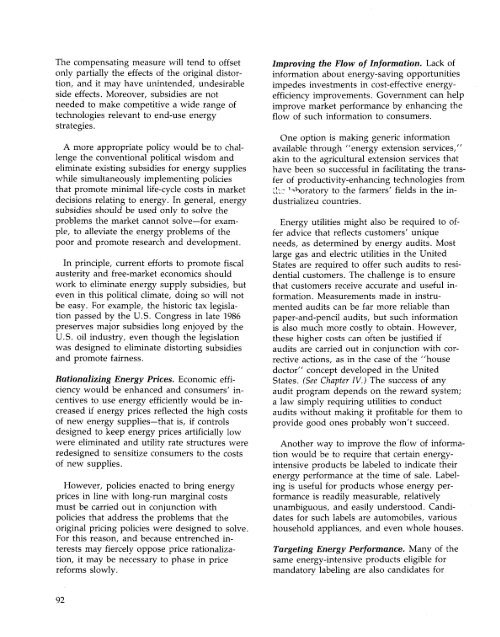ENERGY FOR A SUSTAINABLE WORLD - World Resources Institute
ENERGY FOR A SUSTAINABLE WORLD - World Resources Institute
ENERGY FOR A SUSTAINABLE WORLD - World Resources Institute
You also want an ePaper? Increase the reach of your titles
YUMPU automatically turns print PDFs into web optimized ePapers that Google loves.
The compensating measure will tend to offset<br />
only partially the effects of the original distortion,<br />
and it may have unintended, undesirable<br />
side effects. Moreover, subsidies are not<br />
needed to make competitive a wide range of<br />
technologies relevant to end-use energy<br />
strategies.<br />
A more appropriate policy would be to challenge<br />
the conventional political wisdom and<br />
eliminate existing subsidies for energy supplies<br />
while simultaneously implementing policies<br />
that promote minimal life-cycle costs in market<br />
decisions relating to energy. In general, energy<br />
subsidies should be used only to solve the<br />
problems the market cannot solve—for example,<br />
to alleviate the energy problems of the<br />
poor and promote research and development.<br />
In principle, current efforts to promote fiscal<br />
austerity and free-market economics should<br />
work to eliminate energy supply subsidies, but<br />
even in this political climate, doing so will not<br />
be easy. For example, the historic tax legislation<br />
passed by the U.S. Congress in late 1986<br />
preserves major subsidies long enjoyed by the<br />
U.S. oil industry, even though the legislation<br />
was designed to eliminate distorting subsidies<br />
and promote fairness.<br />
Rationalizing Energy Prices. Economic efficiency<br />
would be enhanced and consumers' incentives<br />
to use energy efficiently would be increased<br />
if energy prices reflected the high costs<br />
of new energy supplies—that is, if controls<br />
designed to keep energy prices artificially low<br />
were eliminated and utility rate structures were<br />
redesigned to sensitize consumers to the costs<br />
of new supplies.<br />
However, policies enacted to bring energy<br />
prices in line with long-run marginal costs<br />
must be carried out in conjunction with<br />
policies that address the problems that the<br />
original pricing policies were designed to solve.<br />
For this reason, and because entrenched interests<br />
may fiercely oppose price rationalization,<br />
it may be necessary to phase in price<br />
reforms slowly.<br />
Improving the Flow of Information. Lack of<br />
information about energy-saving opportunities<br />
impedes investments in cost-effective energyefficiency<br />
improvements. Government can help<br />
improve market performance by enhancing the<br />
flow of such information to consumers.<br />
One option is making generic information<br />
available through "energy extension services,"<br />
akin to the agricultural extension services that<br />
have been so successful in facilitating the transfer<br />
of productivity-enhancing technologies from<br />
i\\? Moratory to the farmers' fields in the industrialized<br />
countries.<br />
Energy utilities might also be required to offer<br />
advice that reflects customers' unique<br />
needs, as determined by energy audits. Most<br />
large gas and electric utilities in the United<br />
States are required to offer such audits to residential<br />
customers. The challenge is to ensure<br />
that customers receive accurate and useful information.<br />
Measurements made in instrumented<br />
audits can be far more reliable than<br />
paper-and-pencil audits, but such information<br />
is also much more costly to obtain. However,<br />
these higher costs can often be justified if<br />
audits are carried out in conjunction with corrective<br />
actions, as in the case of the "house<br />
doctor" concept developed in the United<br />
States. (See Chapter IV.) The success of any<br />
audit program depends on the reward system;<br />
a law simply requiring utilities to conduct<br />
audits without making it profitable for them to<br />
provide good ones probably won't succeed.<br />
Another way to improve the flow of information<br />
would be to require that certain energyintensive<br />
products be labeled to indicate their<br />
energy performance at the time of sale. Labeling<br />
is useful for products whose energy performance<br />
is readily measurable, relatively<br />
unambiguous, and easily understood. Candidates<br />
for such labels are automobiles, various<br />
household appliances, and even whole houses.<br />
Targeting Energy Performance. Many of the<br />
same energy-intensive products eligible for<br />
mandatory labeling are also candidates for<br />
92

















